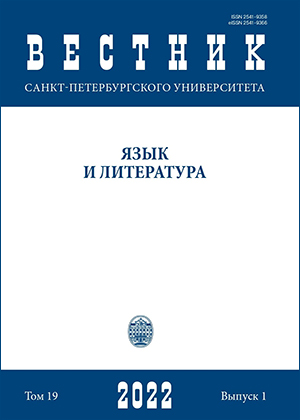The legacy of Sea Island Creole English: Sociolinguistic features of Gullah
DOI:
https://doi.org/10.21638/spbu09.2022.111Abstract
This paper builds on the renewed interest in preserving the multiethnic origins of the United States and recognizing a profound impact of the Black experience on the American nation. The article centers on the Gullah language, one of the primary roots of modern African American English and the only remaining English-related Creole language in North America. The pidgin language, which originally evolved as a medium of communication between slaves from various regions of Africa and their owners, is still spoken by Black communities across coastal regions of South Carolina, Georgia, and Florida. While inland African American English (AAE) has received much attention in linguistic circles over past decades, relatively little research has been done on varieties of AAE spoken in the rural American South. The purpose of this paper is to re-examine the origin and history of Gullah and to present a linguistic description of its most peculiar features. The Gullah language represents a combination of English and Central and West African languages. Geographical isolation, predominance of the Black population, and social and economic independence contributed to its development and survival. Also, in contrast with inland African Americans, the Gullah Geechee communities historically have had little contact with whites. Several folktales written in Gullah have been analyzed for discussing its persistent patterns. Characterizing Gullah is important for our increased understanding of the origins of AAE. Therefore, the article will be useful for scholars interested in Atlantic creoles and in African American and Diaspora Studies.
Keywords:
African American English, Africanisms in Gullah, Atlantic pidgins and creoles, English-based creoles, language contacts
Downloads
References
Abdou 2014 — Abdou N. F. A Study in Gullah as a Creole language, Supported with a Text Analysis. Linguistics and Literature Studies.. 2014, 2 (2): 58–64.
Amos 2011 — Amos A. M. The Living Legacy of Lorenzo Dow Turner: The First African-American Linguist. The Black Scholar.. 2011, 41 (1): 4–15.
Baker, Huber 2001 — Baker P., Huber M. Atlantic, Pacific, and world-wide features in English-lexicon contact languages. English World-Wide. .2001, 22 (2): 157–208.
Brutt-Griffler, Davies 2006 — English and Ethnicity. Signs of Race.. Brutt-Griffler J., Davies C. E. (eds). New York: Palgrave Macmillan US, 2006.
Cunningham 1992 — Cunningham I. A. A syntactic analysis of Sea Island Creole. Tuscaloosa: University of Alabama Press, 1992.
Frank 2007— Frank D. Three irregular verbs in Gullah. In: Synchronic and diachronic perspectives on contact Languages.. Huber M., Velupillai V. (eds). Amsterdam: John Benjamins. P. 159–173.
Holm 1984 — Holm J. Variability of the copula in Black English and its Creole kin. American Speech.. 1984, (59): 291–309.
Holm 2000 — Holm J. An Introduction to Pidgins and Creoles.. Cambridge University Press, 2000.
Jones-Jackson 1983a — Jones-Jackson P. Contemporary Gullah Speech: Some Persistent Linguistic Features. Journal of Black Studies. .1983, 13, (3): 289–303.
Jones-Jackson 1983b — Jones-Jackson P. The audience in Gullah and Igbo: a comparison of oral traditions. CLA Journal. .1983, 27 (2): 197–209.
Jones-Jackson 1984 — Jones-Jackson P. On decreolization and language death in Gullah. Language in Society. .1984, (13): 351–62.
Jones-Jackson 1987 — Jones-Jackson P. When Roots Die: Endangered Traditions on the Sea Islands.. Athens: University of Georgia Press, 1987.
Klein 2007 — Klein T. B. Linguistic identity, agency, and consciousness in Creole: Gullah Geechee and Middle Caicos. In: Linguistic Identity in Postcolonial Multilingual Spaces.. Anchimbe E. (ed.). Newcastle: Cambridge Scholars Publishing, 2007. P. 310–334.
Klein 2009 — Klein T. B. Measuring phonological complexity in creole: Focus on Gullah and Geechee. In: Simplicity and complexity in creoles and pidgins.. Faraclas N., Klein T. B. (eds). London: Battlebridge, 2009. P. 49–66.
Klein 2013 — Klein T. B. The survey of pidgin and creole languages. In: The survey of pidgin and creole languages.. Vol. 1. English-based and Dutch-based Languages. Oxford: Oxford University Press, 2013.
Lester 2004 — Lester J. On Writing for Children & Other People.. New York: Dial Books, 2004.
Minderhout 1995 — Minderhout D. Language and the Social Construction of Identity in Creole Situations. Journal of Linguistic Anthropology. .1995, 5 (1): 117–118.
Mufwene 1991 — Mufwene S. Some Reasons Why Gullah is not Dying Yet. English World-Wide. A Journal of Varieties of English.. 1991, 12 (2): 215–243.
Mufwene 2004 — Mufwene S. Gullah: Morphology and syntax. In: A handbook of varieties of English. A multimedia reference tool.. Kortmann B., Schneider E. W. (eds). Vol. 2. Berlin: Mouton de Gruyter, 2004. P. 356–373.
Mufwene 2015 — Mufwene S. Pidgin and Creole Languages. In: International Encyclopedia of the Social & Behavioral Sciences.. 2nd ed. Amsterdam; New York: Elsevier, 2015. P. 133–145.
Mufwene, Gilman 1987 — Mufwene S., Gilman C. How African Is Gullah, and Why? American Speech.. 1987, 62 (2): 120–139.
Pollitzer 1999 — Pollitzer W. The Gullah People and Their African Heritage.. Athens: University of Georgia Press, 1999.
Ray 2009 — Ray G. B. Language and Interracial Communication in the United States: Speaking in Black and White. New York: Peter Lang, 2009.
Stewart 1969 — Stewart W. Historical and Structural Bases for the Recognition of Negro Dialect. In: Georgetown University Round Table on Languages and Linguistics.. Alatis J. (ed.). Washington: Georgetown University Press, 1969. P. 239–247.
Troike 2012 — Troike R. C. Preverbal no-negation in Gullah. Journal of Pidgin and Creole Languages.. 2012, 27 (2): 235–254.
Turner 2002 — Turner L. D. Africanisms in the Gullah dialect.. [1949] Columbia: University of South Carolina Press, 2002.
Weldon 2007 — Weldon T. L. Gullah negation: A variable analysis. American Speech. .2007. 82 (4): 341–366.
Wood 1974 — Wood P. H. Black Majority: Negroes in Colonial South Carolina from 1670 through the Stono Rebellion.. New York: Alfred A. Knopf, 1974.
Downloads
Published
How to Cite
Issue
Section
License
Articles of "Vestnik of Saint Petersburg University. Language and Literature" are open access distributed under the terms of the License Agreement with Saint Petersburg State University, which permits to the authors unrestricted distribution and self-archiving free of charge.






